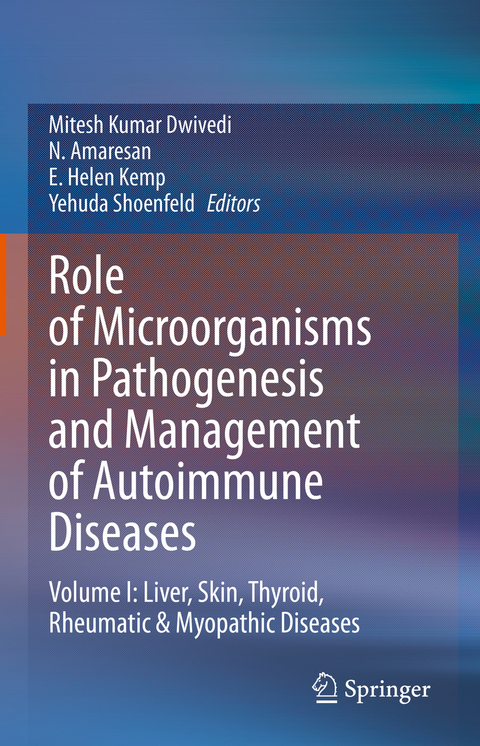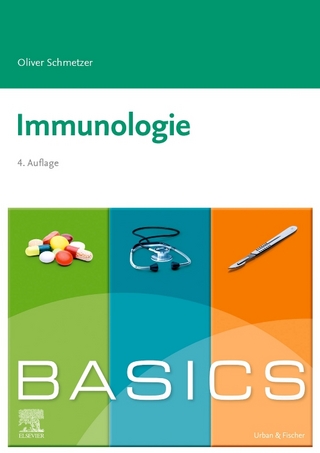
Role of Microorganisms in Pathogenesis and Management of Autoimmune Diseases
Springer Verlag, Singapore
978-981-19-1945-9 (ISBN)
Contributions in the book focuses on the role of microbiota/probiotics and their distinct mechanisms exerted in management of autoimmune liver, skin, thyroid, rheumatic and myopathic diseases. This could help in better understanding to design therapeutic strategies that can be deployed to prevent these autoimmune diseases.
The book has an interdisciplinary appeal and scholars with an interest immunology, medical microbiology and nutritional sciences will value its contribution. Overall, the book gives a new dimensions and insight in the aspects of microbial role in autoimmune disease pathogenesis and therapeutic aspects.
Dr. Mitesh Kumar Dwivedi is an assistant professor of microbiology at C. G. Bhakta Institute of Biotechnology, Uka Tarsadia University. He has published 54 research papers in reputed journals, written 16 book chapters, and is the editor of 6 books. He has an h-index of 21 with 1627 citations for his research papers. He has more than 14 years of experience in research and teaching in various allied fields of microbiology and immunology. He has contributed significantly in the field of vitiligo- a skin autoimmune depigmenting disorder. His current research interests include investigation of immunogenetic, autoimmune & therapeutic aspects of Vitiligo, Rheumatoid arthritis, Sickle cell disease and role of Probiotics in ameliorating the autoimmune diseases. He has been serving as an editorial board member and reviewer of many international journals. He has been honored with many international and national awards for his excellent research performance [DST-SERB Core ResearchGrant (2022), Best Researcher Award (2020), INSA Visiting Scientist Award (2019), DST-SERB Early Career Research Award (2018), Young Scientist Awards (2011, 2013, and 2018)] and secured all India rank “32” in CSIR-NET National examination (2011; Life Sciences). He has successfully completed research projects from national funding agencies such as SERB-DST, GUJCOST, UTU, and Neosciences & Research Solutions Pvt. Ltd. and guided students for their doctoral and master degrees. Dr. N. Amaresan is an Assistant Professor at C.G. Bhakta Institute of Biotechnology, UkaTarsadia University, Gujarat. He has received his undergraduate, postgraduate and doctorate degree in Microbiology. Dr. N. Amaresan has over fifteen years of experience in teaching & research in various allied fields of microbiology mainly microbial ecology, plant-microbe interactions, and others. He has been awarded young scientist awards by Association of Microbiologists of India, National Academy of Biological Sciences and recipient of visiting scientist fellowship from National Academy of India. He has published more than 100 research articles, books and book chapters of national and international reputes. He has handled various projects sponsored by DBT, DST, GEMI etc., and guided students for their doctoral and master degrees. Dr. E. Helen Kemp completed her PhD in Microbiology at the University of Warwick and the Centre for Applied Microbiology and Research, Salisbury, in 1988. Since 1989, she has worked at the University of Sheffield as a Research Fellow in the Medical School. She has long-standing interests in the autoimmune and genetic aspects of the depigmenting disease vitiligo, characterising autoimmune responses against the calcium-sensing receptor in patients with parathyroid autoimmunity, and the aetiology of autoimmune thyroid disease. She has published more than 70 research papers in these areas of research and has contributed to books and review articles inthe field of autoimmunity. Professor Yehuda Shoenfeld is the founder and head of the Zabludowicz Center for Autoimmune Diseases, at the Sheba Medical Center, which is affiliated to the Sackler Faculty of Medicine in Tel-Aviv University, in Israel. Professor Shoenfeld is also the Incumbent of the Laura Schwarz-Kipp Chair for Research of Autoimmune Diseases at the Tel-Aviv University. Professor Shoenfeld’s clinical and scientific works focus on autoimmune and rheumatic diseases, and he has published more than 2250 papers in journals such as New Eng J Med, Nature, Lancet, Proc Nat AcadScie, J Clin Invest, J Immunol, Blood, FASEB, J Exp Med, Circulation, Cancer and others. His articles have had over 65,000 citations. His Scopus h-index is 123. He has written more than 350 chapters in books, and has authored and edited 35 books, some of which became cornerstones in science and clinical practice, such as "The Mosaic of Autoimmunity", "Infections and Autoimmunity" and the textbook "Autoantibodies" and "Diagnostic criteria of autoimmune diseases", all of which were published by Elsevier and sold thousands of copies. Professor Shoenfeld is on the editorial boards of 43 journals in the field of rheumatology and autoimmunity and is the founder and the editor of the IMAJ (Israel Medical Association Journal) the representative journal of science and medicine in the English language in Israel, and also is the founder and Editor of Autoimmunity Reviews (Elsevier) (Impact factor 9.975) and co-Editor of the Journal of Autoimmunity (Impact factor 7.o). For the past twenty years Yehuda has been the Editor of “Harefuah” – The Israel journal in medicine (Hebrew). Professor Shoenfeld received the EULAR prize in 2005, in Vienna, Austria: "The infectious etiologyof anti-phospholipid syndrome", and received a gold medal from the Slovak Society of Physicians for his contribution to Israel – Slovakia collaboration (March 2006). He is also an honorary member of the Hungarian Association of Rheumatology and the Royal Society of Physicians (UK). In UC Davis, USA, Professor Shoenfeld received the Nelson's Prize for Humanity and Science for 2008. In 2009 he was honoured as Doctoris Honoris Causa, from Debrecen University (Hungary) and Hasselt University in Belgium( 2018) , and from 2009 he is honorary member of the Slovenian National Academy of Sciences. He was recently awarded a Life Contribution Prize in Internal Medicine in Israel, 2012 as well as the ACR Master Award in 2013.In 2018 he was elected to the Israeli Academy of Sciences. 2021 -Was nominated as a President of the Ariel University in Israel. Professor Shoenfeld has educated a long list of students with >55 becoming heads of departments and institutes.
Part I: OVERVIEW OF INFECTIOUS MICROORGANISMS & MICROBIOTA IN INDUCING AUTOIMMUNIT.- Chapter 1. The Concept of Infection Triggered autoimmunity.- Chapter 2. The interaction of gut microbiota with immune system and their effects on immune cell development and function.- Chapter 3. The Link between gut microbiota and autoimmune diseases.- Chapter 4. The factors influencing gut microbiota in autoimmune diseases.- PART II: MICROORGANISMS IN PATHOGENESIS & MANAGEMENT OF AUTOIMMUNE LIVER DISEASES.- Chapter 5. Microorganisms in pathogenesis and management of Autoimmune hepatitis (AIH).- Chapter 6. Microorganisms in pathogenesis and management of Primary Biliary Cholangitis.- Chapter 7. Microorganisms in pathogenesis and management of Primary biliary cholangitis.- PART III: MICROORGANISMS IN PATHOGENESIS & MANAGEMENT OF SKIN AUTOIMMUNE DISEASES.- Chapter 8. Microorganisms in pathogenesis and management of Psoriasis.- Chapter 9. Microorganisms in pathogenesis and management of Vitiligo.- Chapter 10. Microorganisms in pathogenesis and management of Scleroderma (systemic sclerosis).- Chapter 11. Microorganisms in pathogenesis and management of Atopic Dermatitis.- Chapter 12. Microorganisms in pathogenesis and management of Pemphigus Vulgaris.- Chapter 13. Microorganisms in pathogenesis and management of Bullous pemphigoid.- PART IV: MICROORGANISMS IN PATHOGENESIS & MANAGEMENT OF AUTOIMMUNE THYROID DISEASES.- Chapter 14. Microorganisms in pathogenesis and management of Graves's Disease.- Chapter 15. Microorganisms in pathogenesis and management of Hashimoto's Thyroiditis.- PART V: MICROORGANISMS IN PATHOGENESIS & MANAGEMENT OF AUTOIMMUNE RHEUMATIC DISEASES.- Chapter 16. Microorganisms in pathogenesis and management of Rheumatoid Arthritis (RA).- Chapter 17. Microorganisms in pathogenesis and management of Spondyloarthritis.- Chapter 18. Microorganisms in pathogenesis and management of Ankylosing spondylitis (AS).- Chapter 19. Microorganisms in pathogenesis and management of Psoriasis Arthritis (PsA).- Chapter 20. Microorganisms in pathogenesis and management of Systemic Lupus Erythematosus (SLE).- Chapter 21. Microorganisms in pathogenesis and management of Sjogren’s syndrome.- Chapter 22. Autoimmune Diseases Associated with Chikungunya Infection.- PART VI: MICROORGANISMS IN PATHOGENESIS & MANAGEMENT OF IDIOPATHIC INFLAMMATORY MYOPATHIES.- Chapter 23. Microorganisms in pathogenesis and management of dermatomyositis (DM) and polymyositis (PM).- Chapter 24. Microorganisms in pathogenesis and management of necrotizing autoimmune myopathy (NAM) and inclusion body myositis (IBM).
| Erscheinungsdatum | 17.08.2022 |
|---|---|
| Zusatzinfo | 26 Illustrations, color; XIX, 680 p. 26 illus. in color. |
| Verlagsort | Singapore |
| Sprache | englisch |
| Maße | 155 x 235 mm |
| Themenwelt | Studium ► Querschnittsbereiche ► Infektiologie / Immunologie |
| ISBN-10 | 981-19-1945-3 / 9811919453 |
| ISBN-13 | 978-981-19-1945-9 / 9789811919459 |
| Zustand | Neuware |
| Informationen gemäß Produktsicherheitsverordnung (GPSR) | |
| Haben Sie eine Frage zum Produkt? |
aus dem Bereich


